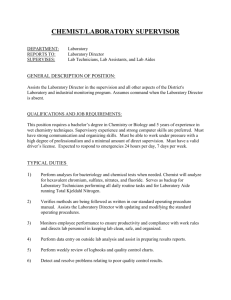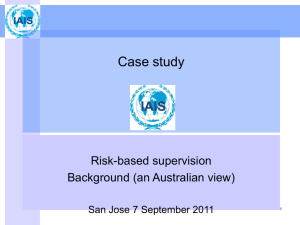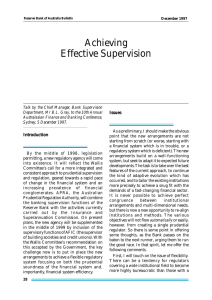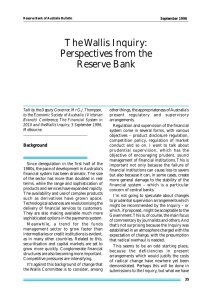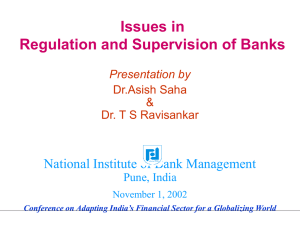Chapter_3_Taming_financial_markets_demands_EN
advertisement
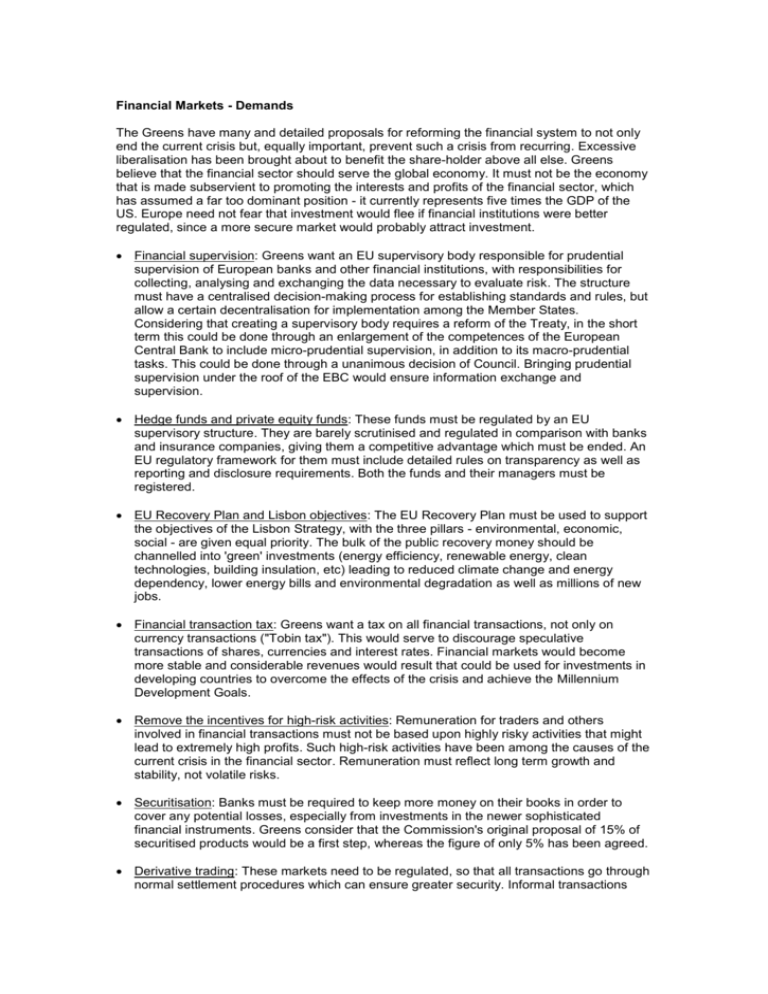
Financial Markets - Demands The Greens have many and detailed proposals for reforming the financial system to not only end the current crisis but, equally important, prevent such a crisis from recurring. Excessive liberalisation has been brought about to benefit the share-holder above all else. Greens believe that the financial sector should serve the global economy. It must not be the economy that is made subservient to promoting the interests and profits of the financial sector, which has assumed a far too dominant position - it currently represents five times the GDP of the US. Europe need not fear that investment would flee if financial institutions were better regulated, since a more secure market would probably attract investment. Financial supervision: Greens want an EU supervisory body responsible for prudential supervision of European banks and other financial institutions, with responsibilities for collecting, analysing and exchanging the data necessary to evaluate risk. The structure must have a centralised decision-making process for establishing standards and rules, but allow a certain decentralisation for implementation among the Member States. Considering that creating a supervisory body requires a reform of the Treaty, in the short term this could be done through an enlargement of the competences of the European Central Bank to include micro-prudential supervision, in addition to its macro-prudential tasks. This could be done through a unanimous decision of Council. Bringing prudential supervision under the roof of the EBC would ensure information exchange and supervision. Hedge funds and private equity funds: These funds must be regulated by an EU supervisory structure. They are barely scrutinised and regulated in comparison with banks and insurance companies, giving them a competitive advantage which must be ended. An EU regulatory framework for them must include detailed rules on transparency as well as reporting and disclosure requirements. Both the funds and their managers must be registered. EU Recovery Plan and Lisbon objectives: The EU Recovery Plan must be used to support the objectives of the Lisbon Strategy, with the three pillars - environmental, economic, social - are given equal priority. The bulk of the public recovery money should be channelled into 'green' investments (energy efficiency, renewable energy, clean technologies, building insulation, etc) leading to reduced climate change and energy dependency, lower energy bills and environmental degradation as well as millions of new jobs. Financial transaction tax: Greens want a tax on all financial transactions, not only on currency transactions ("Tobin tax"). This would serve to discourage speculative transactions of shares, currencies and interest rates. Financial markets would become more stable and considerable revenues would result that could be used for investments in developing countries to overcome the effects of the crisis and achieve the Millennium Development Goals. Remove the incentives for high-risk activities: Remuneration for traders and others involved in financial transactions must not be based upon highly risky activities that might lead to extremely high profits. Such high-risk activities have been among the causes of the current crisis in the financial sector. Remuneration must reflect long term growth and stability, not volatile risks. Securitisation: Banks must be required to keep more money on their books in order to cover any potential losses, especially from investments in the newer sophisticated financial instruments. Greens consider that the Commission's original proposal of 15% of securitised products would be a first step, whereas the figure of only 5% has been agreed. Derivative trading: These markets need to be regulated, so that all transactions go through normal settlement procedures which can ensure greater security. Informal transactions should be eliminated, for they allow no transparency or supervision, and encourage excessive risk. Tax havens: These must be eliminated, for they encourage tax evasion and fraud and constitute black holes with respect to regulation and supervision of financial institutions. All countries must disclose information on money entering their jurisdiction in the name of transparency. Multinational companies in developing countries: Large corporations that operate internationally must be required to disclose their profits and the taxes paid in other countries where they operate, including developing countries. Under current banking secrecy provisions, developing countries are estimated to lose billions of dollars of tax revenue. Savings directive: The scope of this directive should be expanded from only classical payments of interest to include other types of interest income from the new innovative financial instruments, which have so far escaped taxation. It must also apply to foundations, trusts and other institutions and not only individuals.
